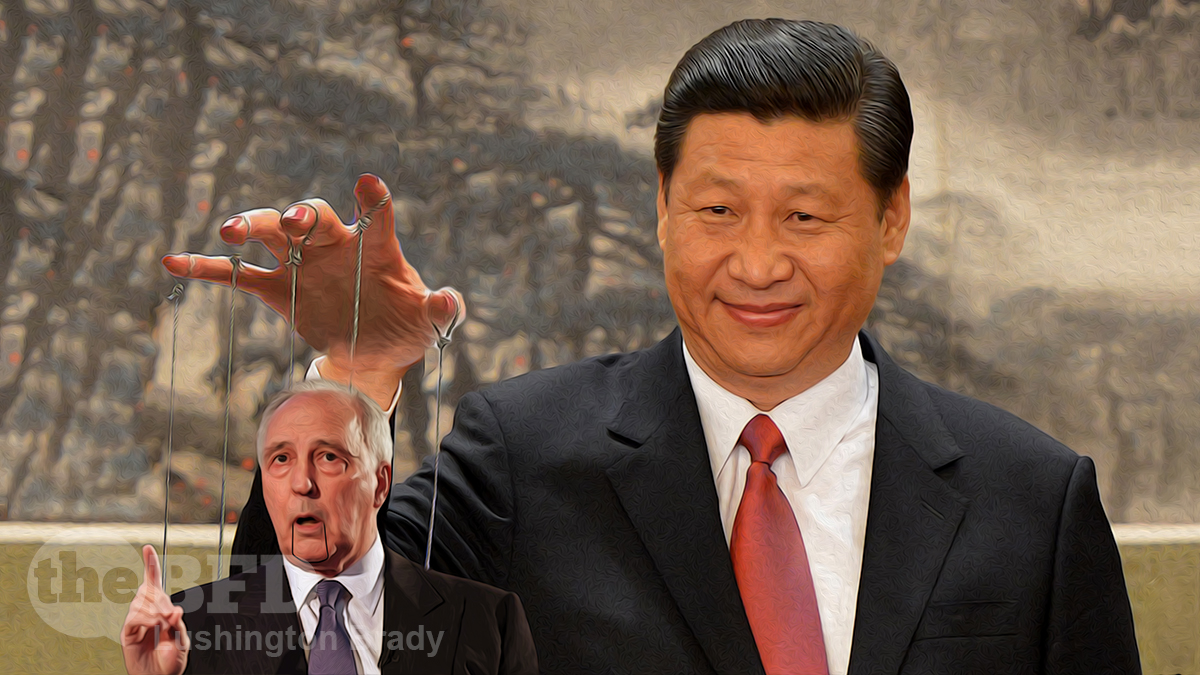As I reported yesterday, the ASIO chief warned that Australia was battling unprecedented assault from both without and within. At the same, Mike Burgess said, Australia was facing off more spying by a hostile foreign power than at any other time in its history, it’s being sapped from within by useful idiots, lackeys and fifth columnists.
Powerful figures, according to Burgess, were using “flimsy” excuses to undermine efforts to protect the nation.
With impeccable timing, China Development Bank advisory board member, former PM Paul Keating, has outed himself for all to see.
Keating, who continues to attack the AUKUS alliance and the nuclear sub deal that accompanies it, has launched a blistering attack on so-called “little Americans”. Who the Little Emperor would prefer Australia align itself with is as obvious as it is tacit.
In terms of Australia’s sovereign interests – the gift of a continent, our position and proximity to Asia – these people prefer an exclusive faith in an Atlantic power half a world away.
Apparently Keating has forgotten that America is also a Pacific power. Keating also chooses to ignore that it was the great Labor wartime PM John Curtin who first recognised that Australian and US interests came together in the Pacific.
Instead, Keating the bitter partisan launches a bizarre attack on Robert Menzies.
The historian Manning Clark used to refer to people like Menzies, Stanley Bruce and Casey as Austral-Britons. People whose ambivalence as to their identity and allegiances compromised their commitment to Australia.
Again, Keating’s memory is as selective as his rancor. Menzies instituted the Colombo Plan, for instance, and steered the normalisation of relations with Japan that led to that former bitter enemy becoming, within a generation, one of Australia’s closest trade partners and allies.
Even more bizarre is Keating’s turn to Manning Clark in order to attack supposedly divided loyalties. Clark’s own loyalties were notable: not only an alleged recipient of the Order of Lenin, Clark was also awarded the Lenin Jubilee Medal in 1970 for his work on behalf of a Soviet front, the Australia-USSR Friendship Society. Clark was quite the hagiographer of Lenin, whom he described as a “teacher of humanity” and “Christ-like”.
More importantly, though, to whom does Keating really think Australia’s values, history, culture and interests align most closely with? The United States, or the Chinese Communist Party?
But it’s the strategic sting in AUKUS’ tail which really gets Keating’s goat. Australia possessing world-class nuclear submarines would pose a grave threat to any Chinese military expansion in our region. Naturally, Keating is adamantly opposed.
Were we to procure eight Virginia-class US submarines, only two or three would ever be at sea on station.
At about $9bn per submarine, a fleet of eight (in 25 years’ time) would cost about $70bn in today’s dollars – $70bn to fire conventional torpedoes from two to three boats only at the same time.
The Australian
The value of Keating’s strategic argument can be gauged by the fact that he apparently thinks that torpedoes are the primary weapon of a modern submarine fleet.
In the end, though, no matter how assiduously Xi Xinping is trying to turn the Pacific into a Chinese lake, America’s interest in the Pacific region is of incalculable strategic importance to Australia. America in the Pacific matters as much today as it did in 1942.
It’s not without a certain irony that Keating coined the term “Relevance Deprivation Syndrome”. It’s long past time that he reflected on how it applies to himself and his continued useful idiocy for Australia’s enemies.

